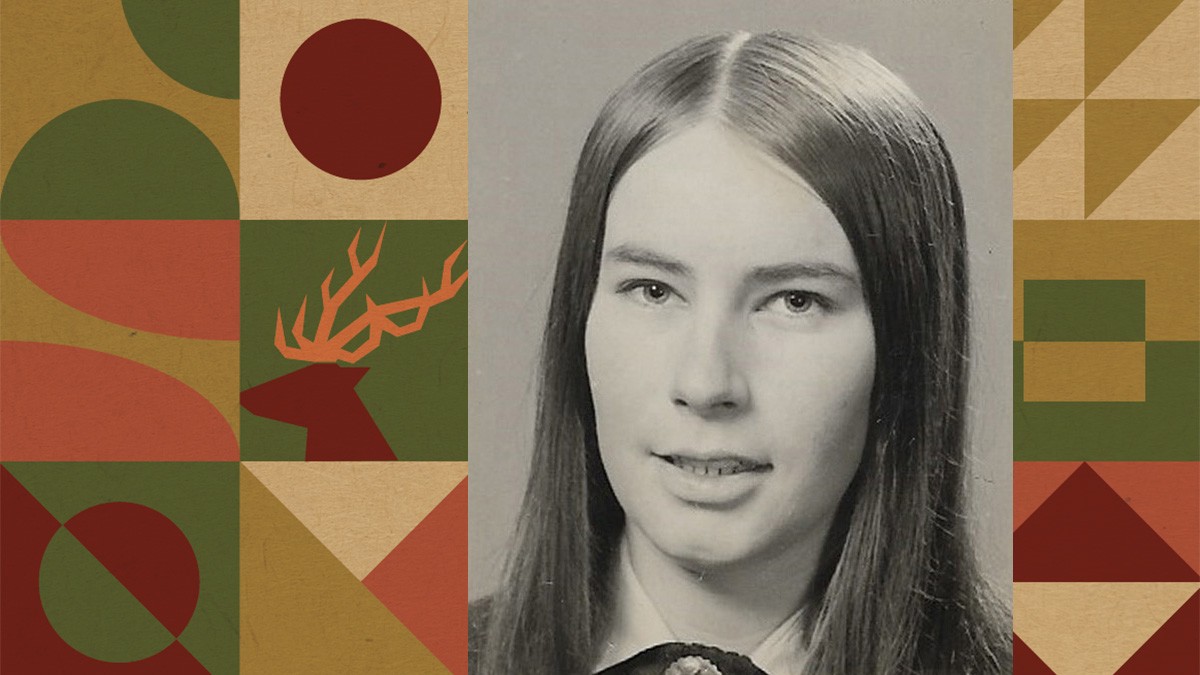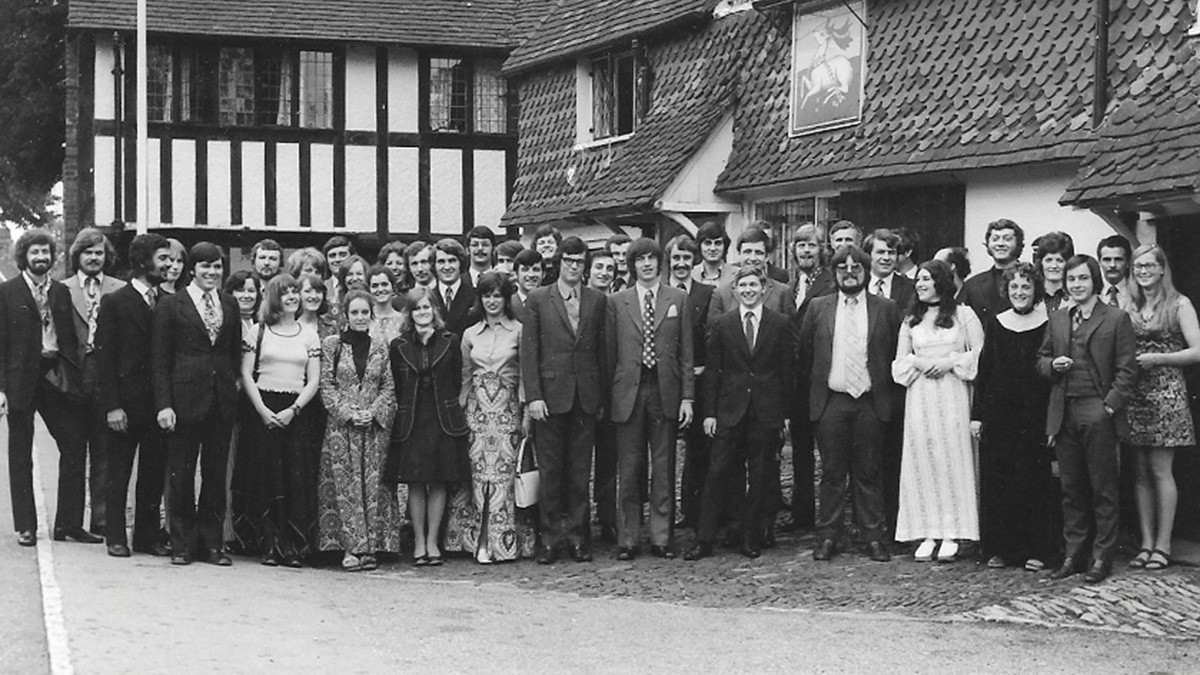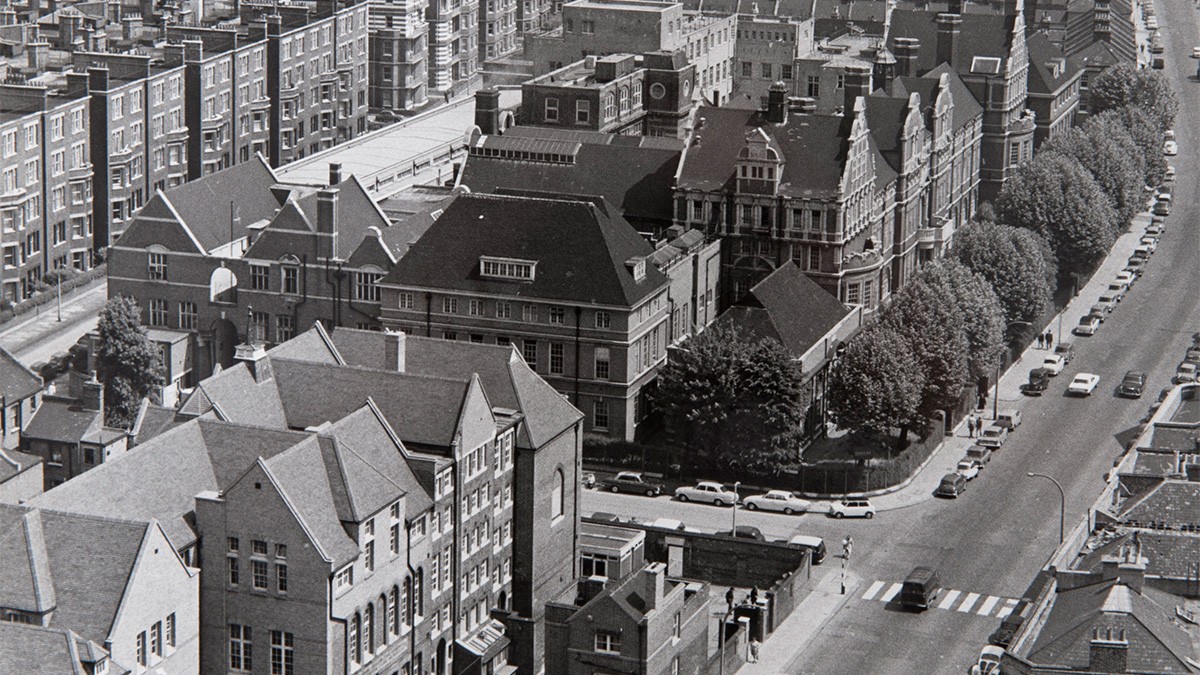“The Guildford campus was a building site…”
Christine Bulcock (née Alexander) left her home in Northumberland to study a BSc in Hotel and Catering Administration from 1968-1972. Originally based at our Battersea campus, she arrived in Guildford in 1970. She still vividly recalls that first day in South London, though…

Christine in 1972 about to start her career following graduation
Why did you come to Surrey?
The BSc in Hotel and Catering Administration was one of the first degrees of its type in the UK. I’m pretty sure the only other place offering this subject at the time was Strathclyde University. Surrey was very much a pioneer in this area.
What attracted you to the University?
I’m sure the lure of studying in London, as the course was initially based in Battersea before it moved to the Guildford campus, was a key attraction. It seemed like a big adventure. I was at Battersea for 18 months from October 1968, then I started the industrial placement year in 1970. When that ended, everything had moved to Guildford and I was there for 18 months from 1971-1972.
What was it like to study at Battersea?
For somebody brought up in the wilds of Northumberland, tipping out onto Battersea Park Road was something of a culture shock. The wave of gentrification hadn’t swept into that part of London yet. The Power Station was still operating and our halls of residence were in Stockwell. It could be quite “lively”. But student life in London at that time was great fun.
I recall a RAG Week event where I joined a Courland Grove float populated by characters from The Magic Roundabout, a RAG Ball concert where the Bonzo Dog Doo-dah Band played and a gig featuring Jethro Tull.
We went into London, too. I remember seeing the Rolling Stones play in Hyde Park. But most of our socialising was done in and around where we lived and studied.
What was it like to study at Guildford?
It was a building site. The facilities were new, though. We had a training restaurant and practical rooms, which were very good. The Food Science Lab, which was run by John O’Connor, was excellent, too. The muddy campus may have been a bit of a mess, but the academic side of it was good.
Being in Guildford was a contrast to London. By this time, you’d established your friendship groups and being a student wasn’t the mad, frenetic world of being a fresher and finding your feet. I remember it as a much more settled and stable period. Guildford was a nice place to be.
Why did you choose your particular course?
I was considering studying languages, but I was attracted to the BSc in Hotel and Catering Administration because it was novel and it was very practical. There was no burning vocational desire to study the subject. It just sounded different and intriguing. I thought I’d go and try it.
What were the best bits of the course?

The Hotel and Catering Administration BSc cohort from Christine's graduation year in 1972
The Food Preparation modules were excellent. I remember going for my interview at Battersea and seeing the kitchen set-up that supported the practical side of the course and being impressed. I also recall they were preparing a dish involving tripe, which was something I’d never seen before.
The Restaurant Service and the Food Science modules were good. We also did Hotel Operations with Ed Davis and Phillip Nailon taught Management Science. Rik Medlik was there, too. He was from an economics background and that wasn’t my favourite subject.
Did you live in student accommodation?
I lived in Courland Grove when I was at Battersea. The other student accommodation there was Ralph West Hall, which was nearer the River Thames. Most of the socialising went on in those halls of residence. I met people studying chemistry, biochemistry and all sorts of subjects.
In Guildford, I initially lived about a 15-minute walk away from campus. In my final year, I lived on campus. Not, however, in one of the novel “Diddy Houses”.
Where was your industrial placement?
I did my industrial placement with the catering division of J Lyons & Co, whose firm included restaurant chains, food manufacturing and hotels. I had so many opportunities through that company. They were extremely well-prepared for students on industrial placements. I was based at the Corner House on The Strand in London.
The only down side was that women weren’t allowed in the main kitchen at Corner House. The chef had “traditional views” and he wouldn’t allow women into his food production area. We were allowed in the satellite kitchens, though.
We did a lot of outdoor catering. We waited at Buckingham Palace garden parties, Wimbledon, Lingfield racecourse and the Game Fair at Knutsford. We went all over. At the end of my placement, I did a stint at another section of the business that was involved in opening new restaurants. I went back and joined them when I graduated.
Did you take part in any clubs?
I was a member of the Hotel and Catering Association. But I think that was about it.
What was Guildford like?
Town and gown were a bit separated. In fairness, the University had only been there a few years, so that was probably to be expected. But I don’t recall any major antagonism. I mainly spent a lot of my time on campus. It was a lovely place to complete a degree.
What are the highlights of your student days?

Battersea in 1968 was a very different place to the more gentrified world it is today
Getting off the train at Battersea Park Road for the first time remains a vivid memory because it was such a culture change for me. Being in London for the first year was also a real adventure.
The friends I made also remain a cherished memory, particularly as I’m still in touch with several of them and we’ve maintained long-standing friendships.
What did you do following graduation?
After graduation, I joined Lyons and I was involved in part of the business that helped open new restaurants. I then went to work at the Electricity Council, which was the central body for the electricity boards. I worked at the Electric Catering Section on St Martin’s Lane in London, where we planned commercial kitchens.
After that, I left London and moved into higher education at what became the University of Gloucestershire. Initially, I worked as a hotel and catering academic, subsequently moving into the Business School. It was a great transition. The hours were much better for a start!
Did your time at Battersea and Surrey influence your career?
It provided the gateway to my first job at Lyons and everything else after that. I wouldn’t have got into higher education had I not had that initial degree.
Did it help prepare you for your career?
I certainly employed many of the lessons I’d learnt from Ed Davis when it came to preparing my own lectures on hotel and catering operations, and I learnt a lot about marketing when I was at Lyons. They were also quite innovative when it came to work practices and were quite ahead of their time in that respect.
What advice would you give the undergraduate version of yourself?
Take every opportunity that presents itself. You may not feel like you have the confidence to do a certain thing, but go out there and give it a go. You never know what doors it may open.